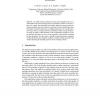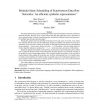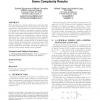7 search results - page 1 / 2 » Bipolar possibility theory in preference modeling: Represent... |
INFFUS
2006
13 years 4 months ago
2006
The bipolar view in preference modeling distinguishes between negative and positive preferences. Negative preferences correspond to what is rejected, considered unacceptable, whil...
ALDT
2009
Springer
13 years 11 months ago
2009
Springer
Abstract. The stable marriage problem has many practical applications in twosided markets like those that assign doctors to hospitals, students to schools, or buyers to vendors. Mo...
EUSFLAT
2007
13 years 6 months ago
2007
This paper deals with a model of decision– making in two stages. In the first stage from a set of expertises one chooses the most rational ones, while in the second stage one o...
EMSOFT
2009
Springer
13 years 8 months ago
2009
Springer
This paper addresses the question of producing modular sequential imperative code from synchronous data-flow networks. Precisely, given a system with several input and output flow...
ATAL
2005
Springer
13 years 10 months ago
2005
Springer
Many industrial or research activities are so expensive that it is often benefitable for the involved agents to cofund the construction or the purchase of a common required resou...



